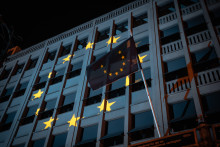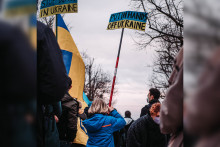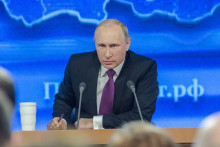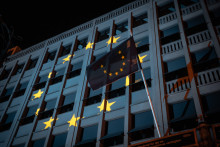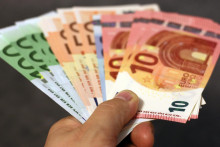According to Donnelly, assistant professor of Technology, Resilience & Europe, the war in Ukraine has entered its second phase. ‘The first phase was to get people on the ground, now Putin’s switched to a more aggressive tactic: he is attacking urban centres and thereby civilian targets. Even though his Kyiv-bound convoy has stalled, it’s still a worrying situation.’
Outrageous atrocities
‘The nuclear plant strike last night underlines that the second phase of the war will be characterised by some outrageous atrocities we’ll have to brace for, but above all, will hit the Ukrainians hard’, adds Donnelly. ‘We already have reports with some degree of verification about weapons being used on civilians that are largely banned for good reason, like cluster bombs and thermobarics, aka vacuum bombs.’
The UT researcher says the nuclear threat by Putin is his ‘deliberate’ response to the economic sanctions and a message for Europe and NATO not to fight in Ukraine directly. ‘But at this stage, I don’t think it’s an immediate threat. In the long term, possibly yes. At a future stage it might happen that, for instance, a plane gets shot down over NATO territory. We could see things spiralling out of control and over borders. That’s not an unrealistic scenario. But for the time being, I wouldn’t worry too much.’
aBOUT Shawn Donnelly
Shawn Donnelly is Assistant Professor for Technology, Resilience & Europe at the department of Public Administration (faculty BMS). His research specialises in comparative and international political economy, covering public (economic) governance in Europe and globally, with expertise in financial stability, crisis response and resilience.
Sanctions
The assistant professor says that the economic sanctions, especially from European countries, are a ‘very big turnaround’. ‘At first it seemed that the counties that depend most on Russian gas were dragging their feet. But the new German government’s approach has allowed the West to cut off not only key Russian banks , but also the Russian central bank – which is instrumental in keeping payments flowing and thereby financing this war. These sanctions have effectively shut off Russia from the rest of the world.’
'What if China supports Putin, even indirectly?'
That could be a heavy blow that Russia is unable to recover from, says Donnelly, since ‘wars tend to be won by the party that has the most economic power’. With that in mind, the role of China should also not be underestimated, says Donnelly. ‘On the UN Security Council, they abstained from voting to condemn the invasion. What if China supports Putin, even indirectly? It’s not just about gas, it’s also about material support and ways to engage in the international trade and finance. We will have to wait and see how China responds and how much they will open a door for Russia.’
European revolution
What Donnelly finds the most fascinating development is – as he calls it – ‘the revolution of Europe’. ‘That’s what I also discussed with my Management, Society & Technology students this week. How Europe has responded so far is bound to turn it into a global power. This war has ignited a major European revolution.’ Again, it’s mainly because of the radical German change of course when it comes to their security, explains Donnelly. ‘With Germany investing a 100 billion euros in their military, it will be the dominant military power in the EU for the next decades. And other countries are also ensuring that their security budget will be at least 2 per cent of their GDP, the NATO norm.’
'You could say that the EU shaking off its dependence on others is long overdue'
‘Germany’s turnaround isn’t only a French dream come true, it’s also an American dream come true’, Donnelly continues. ‘What the US always wanted, was Europe being able to stand on its own feet, take care of its own security, albeit within NATO. The EU has always been a major economic power, but never a military one. Now it will be – and it will be able to fend for itself. This will change us. Still, I don’t expect any intent of the EU to interfere with the war in Ukraine directly.’
Knock-on effect
What’s more, Donnelly thinks that the EU might go further to pay for its security. ‘This could have a knock-on effect. Europe was always reluctant to borrow and spend. But the first steps to break with that pattern was the introduction of Eurobonds during the covid crisis, which is quite similar to a federal budget – in this case worth 750 billion euros. And there are other moving parts, like the Chips Act to secure more digital sovereignty.’
With this momentum, Donnelly thinks that the EU is preparing itself for ‘strategic autonomy’ when it comes to both economics and security. ‘Whether this will cause more geopolitical tensions remains to be seen, but for Europe this is unequivocally a good development. You can’t entirely depend on someone else defending you, Trump showed us that. You could say that the EU shaking off its dependence on others is long overdue.’


